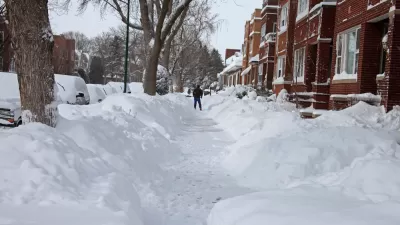With the coming release of Chicago's new Complete Streets Design Guidelines, the city is undertaking a "seismic policy shift" in how it evaluates all transportation projects: by making pedestrians the primary mode for consideration.
For nearly a century, America's cities have based their transportation decisions on prioritizing what's best for the car. But a significant shift being led by cities like Portland and Chicago is giving alternative forms of transportation as much, or more, weight in design and decision-making.
Emily Badger looks at Chicago's new Complete Streets Design Guidelines which contain "a small-sounding but seismic policy shift: From now on, in the design guidelines for every effort from major streetscape projects to minor roadside electrical work, transportation work must defer to a new 'default modal hierarchy.' The pedestrian comes first."
"My feeling is that we have to swing the pendulum in the other direction," says Gabe Klein, commissioner of Chicago’s Department of Transportation. "The fact is that the transit user is also a pedestrian, a cyclist is also a pedestrian, an auto user is also a pedestrian. You may not chose the other modes every day, but every day you’re a pedestrian."
FULL STORY: New Chicago Plan: Pedestrians Come First

Alabama: Trump Terminates Settlements for Black Communities Harmed By Raw Sewage
Trump deemed the landmark civil rights agreement “illegal DEI and environmental justice policy.”

Study: Maui’s Plan to Convert Vacation Rentals to Long-Term Housing Could Cause Nearly $1 Billion Economic Loss
The plan would reduce visitor accommodation by 25% resulting in 1,900 jobs lost.

Planetizen Federal Action Tracker
A weekly monitor of how Trump’s orders and actions are impacting planners and planning in America.

Wind Energy on the Rise Despite Federal Policy Reversal
The Trump administration is revoking federal support for renewable energy, but demand for new projects continues unabated.

Passengers Flock to Caltrain After Electrification
The new electric trains are running faster and more reliably, leading to strong ridership growth on the Bay Area rail system.

Texas Churches Rally Behind ‘Yes in God’s Back Yard’ Legislation
Religious leaders want the state to reduce zoning regulations to streamline leasing church-owned land to housing developers.
Urban Design for Planners 1: Software Tools
This six-course series explores essential urban design concepts using open source software and equips planners with the tools they need to participate fully in the urban design process.
Planning for Universal Design
Learn the tools for implementing Universal Design in planning regulations.
Caltrans
Smith Gee Studio
Institute for Housing and Urban Development Studies (IHS)
City of Grandview
Harvard GSD Executive Education
Toledo-Lucas County Plan Commissions
Salt Lake City
NYU Wagner Graduate School of Public Service



























